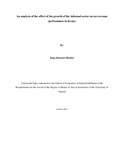| dc.description.abstract | Despite far reaching reforms implemented in taxation in Kenya, tax revenue collection has not
yet reached a level where it can meet all the expenditure requirements of the government. This is
more so the case during this crucial transitional period to the new constitutional dispensation
where the coming into place of a devolved government structure means the public sector wage
bill has been increasing drastically. One of the possible strategies to increase tax revenue
collection is to expand the tax base by bringing in more businesses into the tax bracket. Most of
these untaxed businesses are in the informal sector, and therefore there is a need to analyze this
expansive sector and how it impacts on the overall revenue performance. This is the problem
tackled by this paper. The key objective of the study was to determine the impact of the growth
of the informal sector on tax revenues, with the aim of coming up with policy recommendations
on the way forward regarding the taxation of the informal sector. Using statistical methodology,
the study sought to formulate a model based on the existing data on taxation and the informal
sector, as well as other variables that were identified as determinants of tax revenue based on
past studies. The study employed time series data from secondary sources, including past
research papers, Kenya Economic Surveys, World Bank and IMF Publications, Working papers,
Journals, web sources and text books. The empirical analysis used the Ordinary Least Squares
regression method with the accompanying statistical tests. The results showed that an increase in
the size of the informal sector leads to a decrease in revenue performance and vice versa, and is
statistically significant. The results also indicated that FDI, openness to trade, and per capita
GDP are compellingly significant in determining tax revenue performance. The key policy
recommendations indicate a need to formulate policies that are aimed at including the informal
sector in the tax bracket by fostering voluntary compliance and reducing costs of tax collection. | en_US |

